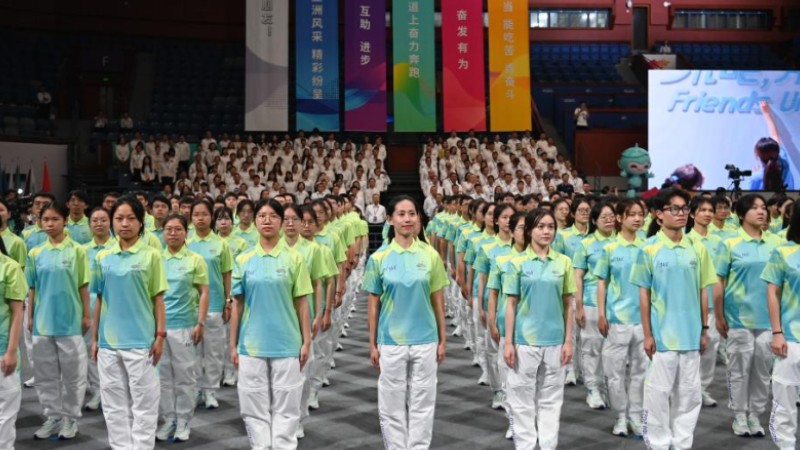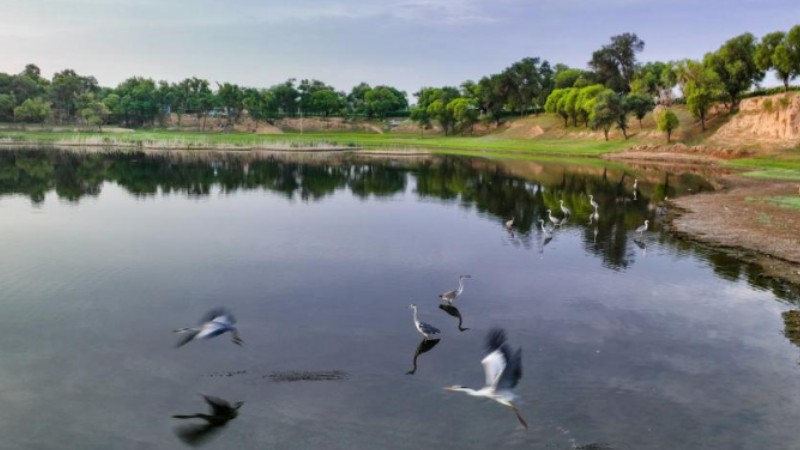China's globally shared wisdom in sand control a microcosm of ecological civilization construction: former Polish president
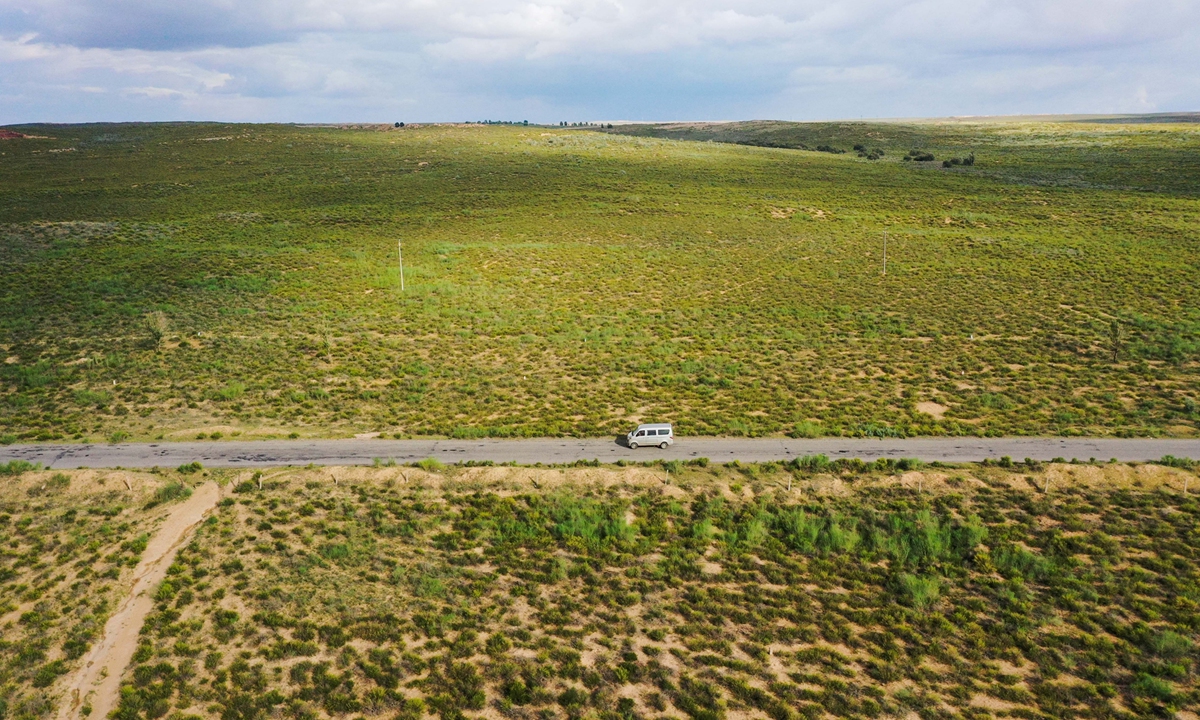
A view of the first expressway crossing the Kubuqi Desert in Hanggin Banner, Ordos City, in North China's Inner Mongolia Autonomous Region. Photo: Xinhua
"I am delighted to once again visit the Inner Mongolia, and witness a group of intelligent people in an intelligent nation utilizing high technology to develop their economy in the desert."
The Ninth Kubuqi International Desert Forum (KIDF) was held from August 25 to 27, in Ordos, North China's Inner Mongolia Autonomous Region. Bronislaw Komorowski, the former president of Poland who was invited to attend the forum, shared his impressions about the event during an exclusive interview with the Global Times recently.
After listening to domestic and foreign experts' views on China's desertification control measures and experiences at the forum, and conducting field investigations to some ecological photovoltaic sand control areas, Komorowski pointed out that the experience of desert control in Kubuqi is a microcosm of China's ecological civilization construction.
"What impressed me is the increasing greening area of the Kubuqi Desert and the modern technology being applied in energy production. It can be seen that the Chinese government is attaching more importance to the issues of ecological environment protection and sustainable development, which is in line with global environmental protection efforts," he said.
As an important participant in the China-proposed Belt and Road Initiative (BRI), Komorowski noted that Poland has also actively carried out a green transformation in recent years. The former president said he admired China's continued assistance to other countries' development of ecological and green economies, and that he also saw vast opportunities for cooperation between China and Poland which benefit from the exchange of experiences in ecological environmental protection and the development of green energy.
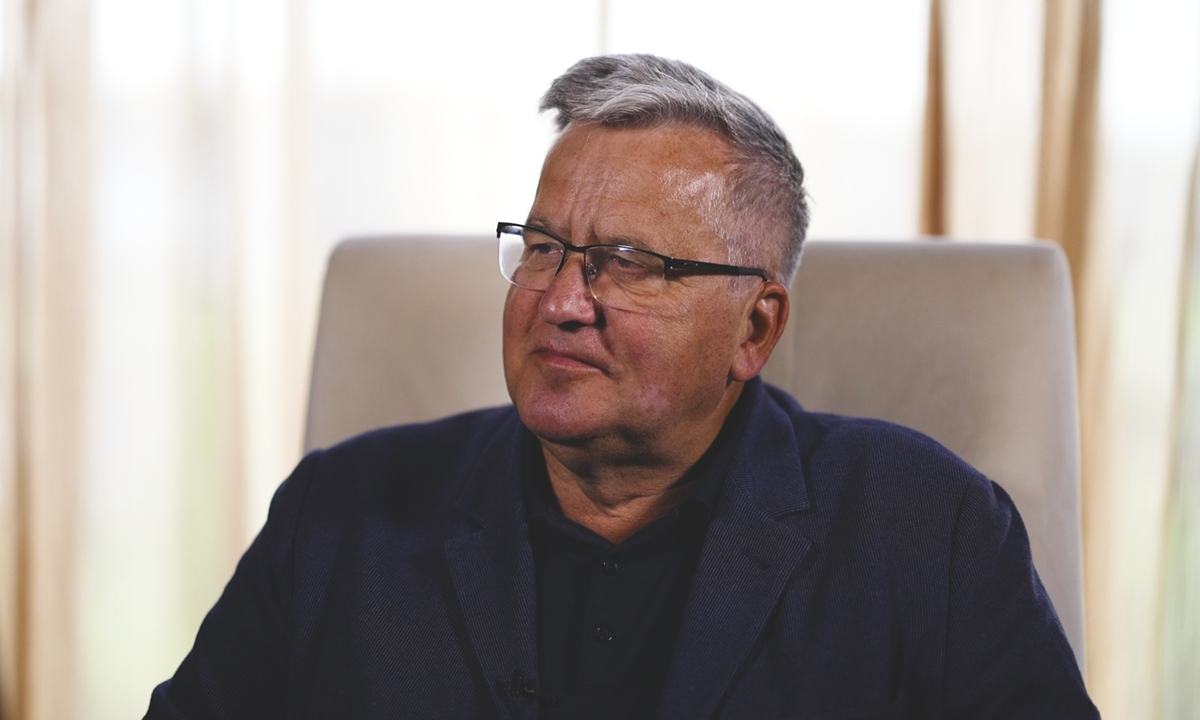
Former Polish President Bronislaw Komorowski during an exclusive interview with the Global Times. Photo: Yu Jiayin/GT
Green miracle in desert
"China's sole emphasis now is no longer fighting desertification, but combines desert control with industrial development to achieve the common development of ecology, industry, and society, which brings new development opportunities to the people in desert areas," said Komorowski, noting that the theme of this year's forum, "Science and Technology Leads Desert Control, Making Deserts Benefit Mankind," aroused his interest and is highly recognized.
Kubuqi Desert is the seventh-largest desert in China, forming a huge yellow sand belt toward the north of the Ordos Plateau, only 800 kilometers away from Beijing. The Kubuqi Desert was once known as "the sea of death."
When the People's Republic of China was founded, the Kubuqi Desert advanced dozens of meters toward the shore of the Yellow River every year. After dozens of years of painstaking management, a third of the 14,100-square-kilometer Kubuqi Desert is now covered with green vegetation. China's Ministry of Science and Technology has conducted a remote analysis of desert changes over the last 20 years, proving that vegetation cover in the core treatment area of the Kubuqi Desert has reached 65 percent, an increase of more than 30 percent compared with that of 10 years ago.
Komorowski, who participated in the 6th Kubuqi International Desert Forum in 2017, considers himself as a witness to the changes in the Kubuqi Desert.
"What happened in Kubuqi Desert is a typical case of using technology to combat desertification and benefit the people. We can see that under the premise of effective governance and strict protection, China has adopted a market-oriented and industrialized approach, effectively integrating desert prevention and control with local economic development, while increasing the income of local people," he said.
Komorowski also expressed his interest in China's use of technology to develop new energy as an important means of desert control. For example, the Elion Resources Group (Elion)'s Kubuqi Desert Control and Yellow River Protection Project has practiced the ecological photovoltaic desert control and protection system. The company has seized the strategic opportunity of China's carbon emission peak and carbon neutrality goals, investing in the construction of a 3.2GW three-dimensional photovoltaic desert control project in Kubuqi Desert, with an annual power generation capacity of 5.5 billion kilowatt-hours.
At the same time, Elion has built a green ecological agriculture system, planting grass, crops, and medicinal herbs under the photovoltaic panels in 150,000-mu solar farm, while also developing eco-tourism. So far, it has lifted 102,000 people out of poverty in the desert area, leading to accelerated rural revitalization.
"The Chinese government has led enterprises and society to continuously explore technological innovations for desertification, making more people realize that as long as it is used reasonably, the desert can become an opportunity and a valuable resource and source of wealth," he said.
Vast space for cooperation
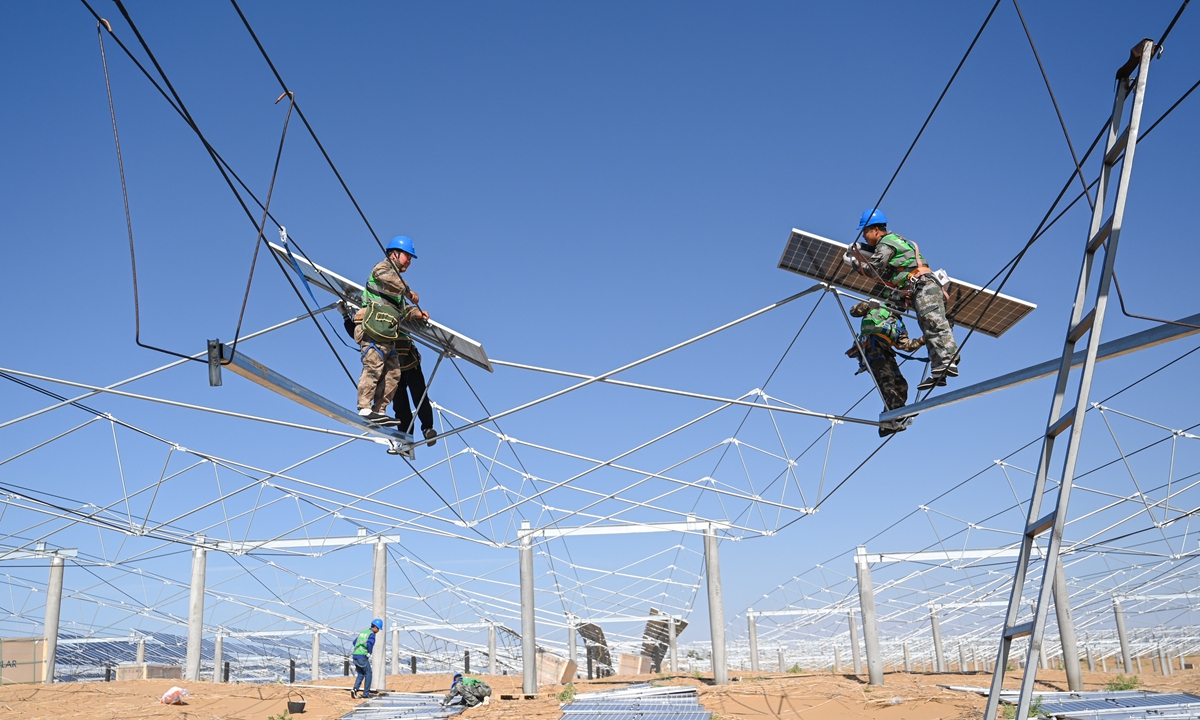
Technicians install photovoltaic sand control project power generation panels in the Kubuqi Desert, on July 22, 2023. Photo: Xinhua
The KIDF is currently the world's only large-scale international forum on desertification control, and has now become an important platform for exchanges on global responses to desertification challenges.
Each country has different ideas and interests, so the international community has some cooperative differences and difficulties in dealing with desertification, which makes it invaluable to carry out dialogues on international cooperation.
Through the forum, more exchanges will be made to find common points of convergence in the interest of many parties, Komorowski said.
Land desertification is a serious challenge facing the whole world. According to United Nations statistics, desertified land area accounts for a quarter of the earth's land surface area, affects a fifth of the world's population, and expands at a rate of 50,000-70,000 square kilometers per year, causing economic losses of up to $42 billion annually.
While over the last decade, China complete the task of sand control and prevention in 282 million mu (18.8 million hectares) of land, reducing the area of sandy land by more than 64.9 million mu, contributing to 25 percent of the world's green increment.
"The increase in forest cover on every inch of China's land is not only a benefit to China, but to human society as a whole," Komorowski said, noting that China, with its vast territory and globally leading economic development, has responded to the trend of the times, consciously assumed the responsibility of a great nation, and demonstrated its ambition to lead the cooperation and development of ecological environmental protection on a global scale.
Komorowski noted that although Poland does not have a desert, it is also active in the area of green transition as a key participant in the BRI. "Poland used to be one of the largest coal producers in Europe and one of the major coal importers. With global energy transition acceleration, Poland is also vigorously laying out the development of new energy, solar, and wind power industries. During the post-epidemic era, the European Union has invested heavily in the new energy industry."
Both China and Poland are facing the important task of deep energy transformation and the development of a green energy economy, and there is a vast space for cooperation in the field of new energy, he stressed.
This year marks the 10th anniversary of China's proposal of building a global community of a shared future and the BRI. China actively promotes international dialogue, alignment between international cooperation on the BRI, and the implementation of the 2030 Agenda.
"China's model of desert management and its achievements in the field of developing new energy have been highly appreciated by the international community. At the same time, China has continued to help other countries develop their ecological and green economies," Komorowski said. "It is believed that more and more countries will benefit from the exchange of experience in this field in the future."
Photos
Related Stories
- Int'l ecological competitiveness forum opens in north China
- China celebrates achievements of its national parks
- Antelopes on road to safety
- Ecology project brings clear water, Asian Games to Zhejiang river
- Infographics: Explore China's national parks
- Building Beautiful China contributes to global environment governance
- A look at China's ecological progress
- Eco Forum Global Guiyang 2023 kicks off in southwest China
- Protection efforts see golden snub-nosed monkeys thrive
- China ratifies National Ecology Day to enhance public awareness, actions
Copyright © 2023 People's Daily Online. All Rights Reserved.







